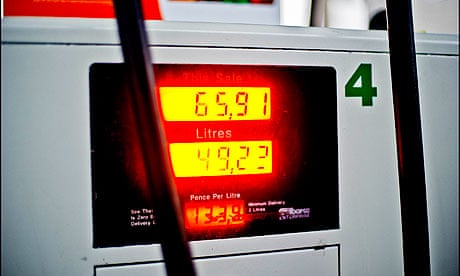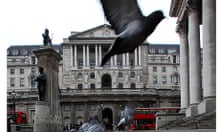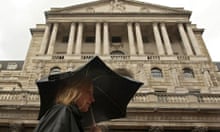City speculation was growing tonight that the Bank of England will start raising interest rates this spring after the latest government figures for the cost of living showed the annual inflation rate shooting up to 3.7% last month.
Despite fears that an increase in borrowing costs will derail economic recovery, the financial markets were braced for the bank rate to increase from 0.5% to 1.25% in three quarter-point jumps by the end of the year – adding £50 a month to the bill for servicing a £100,000 repayment mortgage.
Analysts said the new year increase in VAT coupled with surging global commodity prices would almost certainly result in inflation breaching 4% – double the official target – over the coming months, putting pressure on the Bank's nine-strong monetary policy committee to increase interest rates for the first time since the financial crisis erupted in the summer of 2007.
Official borrowing costs were cut from 5.5% to 0.5% by early 2009 in an attempt to help Britain through its deepest and longest postwar recession and have been left at that level despite inflation being well above target for the past 12 months. The MPC was told of the surprisingly large jump in inflation before last week's decision to keep borrowing costs on hold, but some City economists said the Bank could no longer ignore mounting price pressures in the economy.
Michael Derks, chief strategist at FxPro Financial Services, said: "After this morning's shock inflation figures, it will be extremely difficult for the MPC to avoid hiking rates when it meets next month. Indeed, it is entirely plausible that the MPC will raise the base rate twice in the current half of 2011.
"Inflation expectations have risen markedly in recent months, and gilt investors are rightly starting to question the Bank's inflation-fighting credibility. Higher rates are unlikely to derail the recovery, notwithstanding fiscal austerity. The MPC can no longer afford to prevaricate."
Data from the Office for National Statistics showed that rising air fares, higher petrol prices and dearer food were the main factors behind a 1% jump in prices in December – a record for the month since modern records began in 1994. This compared with a 0.6% increase in December 2009, pushing the annual inflation rate as measured by the consumer prices index up from 3.3% to 3.7%, a far steeper increase than the City had expected.
A different measure of inflation – the retail prices index – is used for most pay settlements, and by this yardstick inflation edged up from 4.7% to 4.8% in December.
Michael Saunders, UK economist at Citigroup, said it was the 23rd time in the past 33 months that inflation had been higher than forecast by the financial markets, adding that the Bank now faced a "crisis of credibility" caused by its apparent willingness to tolerate repeated overshoots in the cost of living.
"We expect that rising inflation expectations and some pick-up in pay deals will prompt the MPC to start hiking in the second or third quarter of 2011," he said.
Bob Crow, general secretary of the RMT union, said his negotiators would factor in higher inflation in pay talks across the transport sector. "We will not tolerate a situation where our members' standard of living is eroded as a result of the mistakes and the reckless gambling of the politicians and the bankers."
TUC general secretary, Brendan Barber, said: "The alarming rise in inflation means prices are running well ahead of pay deals. This will make a tough year for workers even harder to bear, particularly for public servants suffering a sharp real-terms pay cut. Fuelling inflation with a VAT hike will hit workers in their wage packets and shopping receipts. This tax rise is bad for working families and damaging for the economy too."
Business groups, including the British Chambers of Commerce and the Institute of Directors, urged the Bank to resist calls for higher interest rates, warning of damage to the economy as it was already slowing down.
Chris Williamson, chief economist at Markit, said: "The data will clearly add to pressure on the Bank of England to raise interest rates sooner than previously expected … Most importantly, underlying domestic demand remains very weak with signs that economic growth slowed towards the end of last year and is expected to remain subdued in the first quarter. Falling real incomes, high unemployment and widespread job insecurity mean demand is likely to remain lacklustre for some time, and also suggests that higher prices will not feed through to substantially higher wages and salaries."



